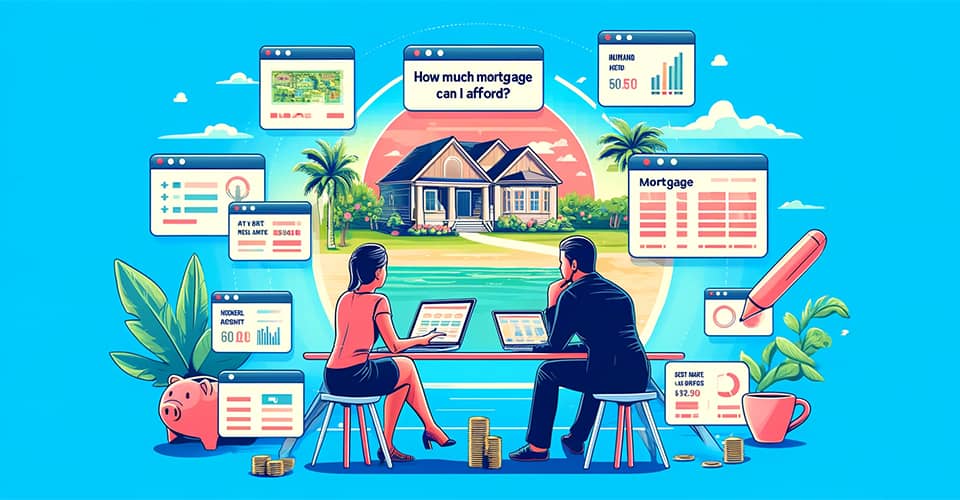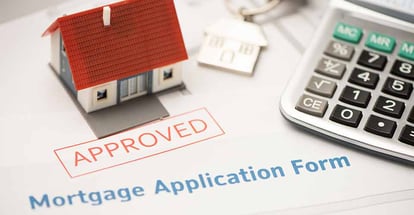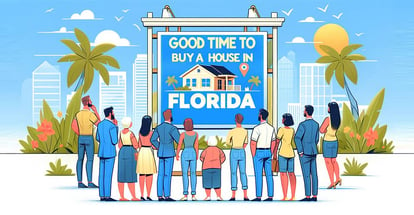How Much Mortgage Can I Afford in Florida? How to Calculate
Buying a home is one of the most significant investments that you will make in your lifetime. It's super exciting, but it's important to make sure you can easily handle the monthly payments.
Knowing what you can afford will help you focus your search and prevent you from being disappointed by falling in love with a house that's too expensive.
In this blog, we'll teach you exactly how to calculate how much home you can afford in Florida in 2024.
Table of Contents
- Determine Your Monthly Income
- Calculate Your Monthly Expenses
- Determine Your Debt-to-Income Ratio (DTI)
- Determine How Much Mortgage You Can Afford
- Consider Other Expenses Related to Owning a Home
- Get Pre-Approved for a Mortgage
- Shop Around for the Best Mortgage
- See What Types of Loans You Qualify For
- Wrapping Up
Step 1 - Determine Your Monthly Income
For Florida homebuyers, it's important to start with a clear understanding of how much mortgage you can afford before beginning your home search.
To do this, you'll want to calculate your monthly income, which includes your salary and any other regular sources of income, such as bonuses and commissions.
If your income varies monthly, you can calculate a more accurate estimate by taking an average of the past few months.
Remember that it's also important to factor in any potential future changes in income, such as a job promotion or anticipated pay increase when determining how much you can afford to borrow.
Step 2 - Calculate Your Monthly Expenses
After determining your monthly income, the next step for Florida homebuyers is to calculate your monthly expenses.
It's important to factor in fixed expenses, such as rent and car payments, and variable expenses, such as groceries and entertainment.
To get a clear picture of your monthly expenses, you can review your bank and credit card statements to identify all regular expenditures.
This step determines how much your monthly income can be allocated towards a mortgage payment.
By subtracting your monthly expenses from your monthly income, you'll see how much you have left over each month for a mortgage payment, savings, and other financial goals.
Step 3 - Determine Your Debt-to-Income Ratio (DTI)
Your debt-to-income ratio (DTI) is a crucial metric in assessing how much Florida mortgage you can afford.
Calculate it by adding your monthly debt payments—including credit cards, car loans, and other obligations—then dividing this sum by your gross monthly income.
For example, if your monthly debts are $2,000 and your gross income is $6,000, your DTI is 33% ($2,000 / $6,000 = 0.33).
Lenders generally prefer a DTI of 36% or less, but requirements vary, so check with your lender. A lower DTI enhances your chances of mortgage approval by demonstrating lower default risk.
Additionally, having a lower DTI means you have more of your income available to invest in your home.
Calculating your DTI and ensuring it meets lender guidelines can improve your mortgage approval odds and help manage your payments comfortably.

Step 4 - Determine How Much Mortgage You Can Afford in Florida in 2024
Calculating how much mortgage you can afford involves multiple factors, including your gross income, debt levels, down payment, and the interest rate on the mortgage.
If you don't want to do this calculation yourself, here are estimated maximum affordable loan amounts and payment amounts for various income levels in Florida:
| Income Level | Maximum Mortgage Payment (varies based on DTI) | Today's Interest Rate | Maximum Affordable Loan Amount |
|---|---|---|---|
| $30,000 | $872 | 7.31% | $118,066 |
| $40,000 | $1,163 | 7.31% | $157,422 |
| $50,000 | $1,454 | 7.31% | $196,778 |
| $60,000 | $1,746 | 7.31% | $236,134 |
| $70,000 | $2,037 | 7.31% | $275,490 |
| $80,000 | $2,328 | 7.31% | $314,846 |
| $90,000 | $2,619 | 7.31% | $354,202 |
| $100,000 | $2,911 | 7.31% | $393,558 |
| $110,000 | $3,202 | 7.31% | $432,914 |
| $120,000 | $3,493 | 7.31% | $472,270 |
| $140,000 | $4,075 | 7.31% | $551,982 |
| $160,000 | $4,657 | 7.31% | $631,694 |
| $180,000 | $5,240 | 7.31% | $711,406 |
| $200,000 | $5,822 | 7.31% | $791,118 |
| $220,000 | $6,404 | 7.31% | $870,830 |
| $240,000 | $6,986 | 7.31% | $950,542 |
| $300,000 | $8,732 | 7.31% | $1,188,178 |
It's important to note that this is just a general guideline, and other factors such as your credit score, employment history, and down payment will also affect your ability to qualify for a mortgage.
Also, you should consider other expenses such as property taxes, homeowners insurance, and maintenance costs when determining how much mortgage you can afford.
Step 5 - Consider Other Expenses Related to Owning a Home
When budgeting for a mortgage, it’s crucial to account for additional homeownership expenses beyond the monthly payment.
These expenses encompass property taxes, homeowner's insurance, homeowner association (HOA) fees (if applicable), and maintenance costs.
In Florida, property tax rates, which depend on the property's location and assessed value, typically range from 0.5% to 2.5%. Investigating the property tax rates in your potential home areas is vital.
Homeowner's insurance is essential, with costs varying by home location, age, condition, and coverage extent. Florida's rates may be higher due to hurricane risks.
If your property is within an HOA, you will also incur HOA fees, which are based on the amenities and services provided.
Additionally, budget for maintenance, which includes routine and unexpected repairs. Setting aside 1% to 4% of the home’s value annually for these costs is advisable.
Step 6 - Get Pre-Approved for a Mortgage
Getting pre-approved for a mortgage is an important step for Florida homebuyers as it can give them a competitive edge when making an offer on a home.
It can also help save time and prevent disappointment by ensuring that you're looking at homes within your price range. When preparing to apply for pre-approval, gather all necessary documentation, such as tax returns, pay stubs, and bank statements.
Remember that getting pre-approved doesn't guarantee approval for a mortgage, but it's a good starting point in the home-buying process.
Step 7 - Shop Around for the Best Mortgage
Florida homebuyers should take the time to shop around for the best mortgage options after getting pre-approved for a mortgage. Doing so can lead to substantial savings in interest rates and fees.
It's important to compare the interest rates, fees, and terms offered by various lenders and any special programs or incentives they may offer.
Remember that the lowest interest rate may not always be the best option for you, as there may be other fees and costs associated with the mortgage. Read the fine print and understand all the terms before committing to a mortgage.
Step 8 - See What Types of Loans You Qualify For
Once you have determined your budget and shopped around for the best mortgage, it's time to see what types of loans you qualify for.
Talk to your lender to learn which loans you qualify for and which might best suit your financial situation.
Conventional Loans
These are loans not guaranteed or insured by the federal government. Private lenders typically offer them and require a higher credit score and larger down payment than government-backed loans.
Conventional loans can be a good option for borrowers with strong credit who can afford a larger down payment.
FHA Loans
These loans are insured by the Federal Housing Administration (FHA) and designed to make homeownership more accessible to low—and moderate-income borrowers who may not qualify for conventional loans.
FHA loans typically require a lower down payment and credit score than conventional loans, but borrowers must pay mortgage insurance premiums.
VA Loans
These are loans guaranteed by the Department of Veterans Affairs (VA). They are available to eligible veterans, active-duty service members, and spouses.
VA loans typically offer competitive interest rates, require no down payment, and do not require private mortgage insurance.
USDA Loans
These are loans guaranteed by the United States Department of Agriculture (USDA). They are designed to help low—and moderate-income borrowers in rural areas purchase a home.
USDA loans typically require no down payment and offer competitive interest rates, but borrowers must meet income and location eligibility requirements.
Wrapping Up
By following these steps, you can determine a realistic and comfortable budget for your financial situation. Consider all expenses related to owning a home and shop for the best mortgage option.
With a solid plan, you can move forward confidently in your home-buying journey and find a home you love within your budget. Good luck!
With over 50 years of mortgage industry experience, we are here to help you achieve the American dream of owning a home. We strive to provide the best education before, during, and after you buy a home. Our advice is based on experience with Phil Ganz and Team closing over One billion dollars and helping countless families.

About Author - Phil Ganz
Phil Ganz has over 20+ years of experience in the residential financing space. With over a billion dollars of funded loans, Phil helps homebuyers configure the perfect mortgage plan. Whether it's your first home, a complex multiple-property purchase, or anything in between, Phil has the experience to help you achieve your goals.


 By
By  Edited by
Edited by 






